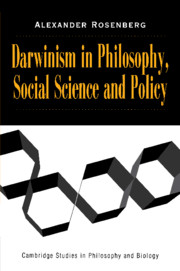Book contents
- Frontmatter
- Contents
- Introduction
- 1 A Field Guide to Recent Species of Naturalism
- 2 Naturalistic Epistemology for Eliminative Materialists
- 3 Limits to Biological Knowledge
- 4 Reductionism Redux: Computing the Embryo
- 5 What Happens to Genetics When Holism Runs Amok?
- 6 The Biological Justification of Ethics: A Best-Case Scenario
- 7 Moral Realism and Social Science
- 8 Contractarianism and the “Trolley” Problem
- 9 Does Evolutionary Theory Give Comfort or Inspiration to Economics?
- 10 The Political Philosophy of Biological Endowments: Some Considerations
- 11 Research Tactics and Economic Strategies: The Case of the Human Genome Project
- Bibliography
- Index
2 - Naturalistic Epistemology for Eliminative Materialists
Published online by Cambridge University Press: 06 July 2010
- Frontmatter
- Contents
- Introduction
- 1 A Field Guide to Recent Species of Naturalism
- 2 Naturalistic Epistemology for Eliminative Materialists
- 3 Limits to Biological Knowledge
- 4 Reductionism Redux: Computing the Embryo
- 5 What Happens to Genetics When Holism Runs Amok?
- 6 The Biological Justification of Ethics: A Best-Case Scenario
- 7 Moral Realism and Social Science
- 8 Contractarianism and the “Trolley” Problem
- 9 Does Evolutionary Theory Give Comfort or Inspiration to Economics?
- 10 The Political Philosophy of Biological Endowments: Some Considerations
- 11 Research Tactics and Economic Strategies: The Case of the Human Genome Project
- Bibliography
- Index
Summary
In this chapter I defend Quine's naturalistic epistemology [Quine, 1969], extend it and respond to its critics. In doing so I have borrowed freely from the work of philosophers who had no thought to defend or extend a Quinean naturalistic epistemology (hereafter QNE), and I have criticized the views of some exponents of (non-Quinean) naturalistic epistemology.
The main theses of QNE are well known: traditional epistemology, a largely or wholly a priori and foundationalist discipline, is to be replaced by an empirical inquiry which will be a “chapter” mainly of psychology. This compartment of psychology is to examine the relation between an epistemic agent's “meager sensory input” and its “torrential output” of descriptions of a three-dimensional world “in order to see how evidence relates to theory.”
Naturalizing epistemology is an inevitable consequence of Quine's rejection of the analytic/synthetic distinction, his repudiation of a difference between a priori and a posteriori and his attack on modality. These three commitments, together and separately, lead through a variety of arguments to the conclusion that philosophy and science are continuous with one another: the former is just very general and abstract scientific theorizing. Accordingly, a compartment of philosophy that deals with psychological states, as epistemology traditionally does, should be viewed as very general and abstract psychological theorizing. Epistemology must be continuous with psychology because philosophy is continuous with science. If science cannot be a priori, neither can epistemology. If there are no truths in virtue of meanings, no appeal to meanings can underwrite epistemological claims, nor can there be a range of necessary truths to which we have epistemic access, and for which an epistemological account must be provided.
- Type
- Chapter
- Information
- Darwinism in Philosophy, Social Science and Policy , pp. 34 - 57Publisher: Cambridge University PressPrint publication year: 2000



